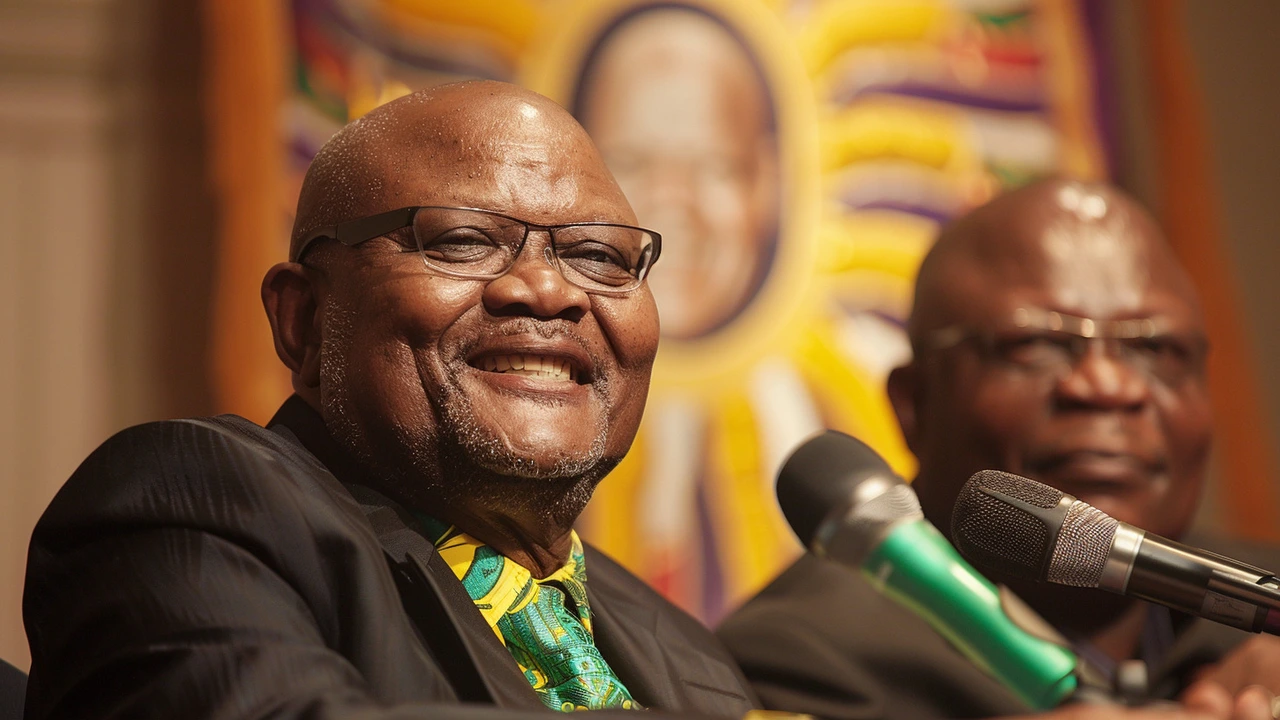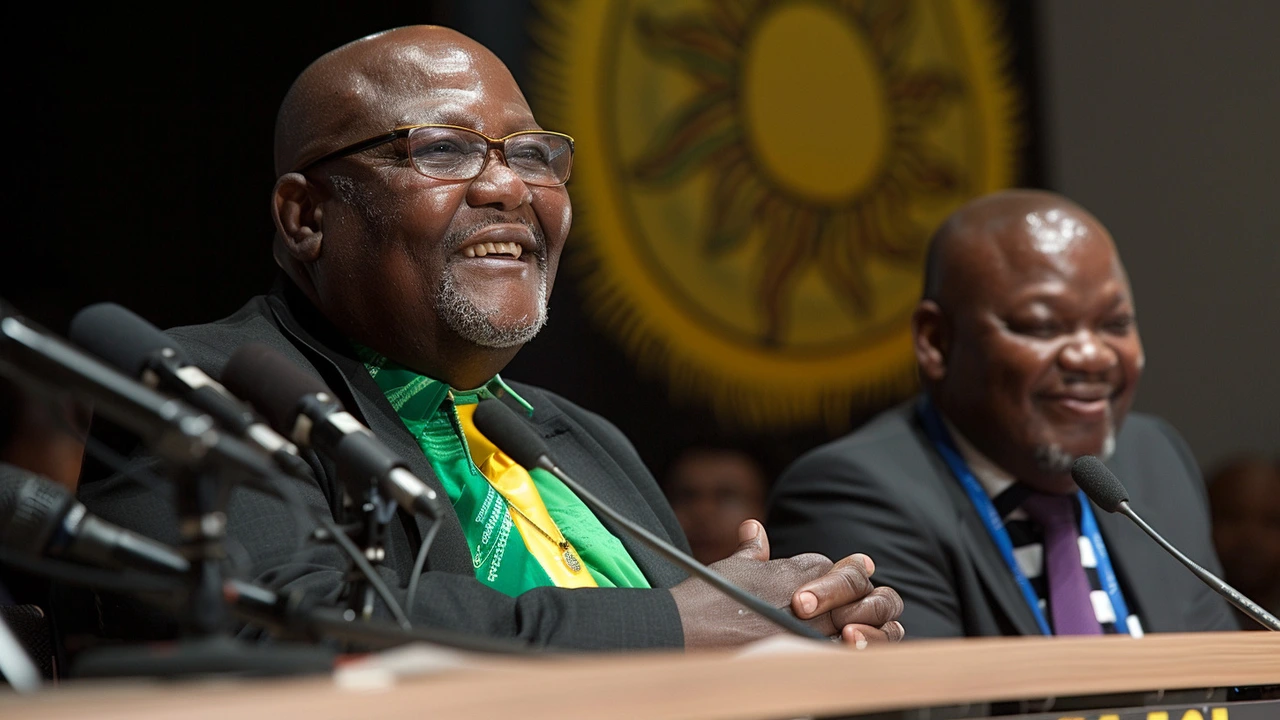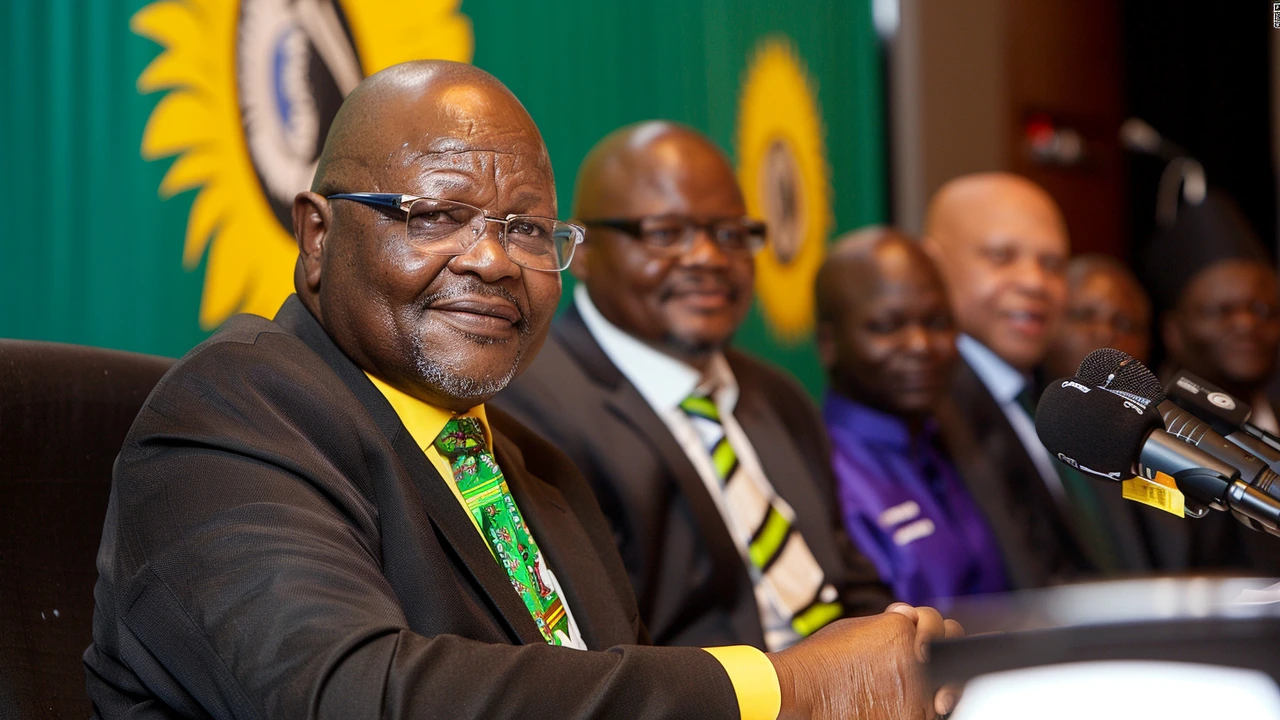Arthur Zwane's Resignation and Its Implications
Arthur Zwane, a notable figure within the MK party, recently announced his resignation as Secretary-General. This unexpected development comes at a critical juncture for the party, marked by internal conflicts and legal battles. Zwane's departure adds another layer of complexity to the already tumultuous situation within the party.
The resignation is particularly significant as it occurs just days before Jacob Zuma, the MK party's leader and former president of the African National Congress (ANC), is scheduled to face charges of misconduct. The charges relate to Zuma's endorsement of the MK party on December 16, a move that the ANC has deemed a breach of its regulations. These charges are set for a hearing on July 17, adding political pressure and uncertainty around the MK party.
In addition to the charges against Zuma, the party itself is wrestling with the fallout from the dismissal of its founder, Jabulani Khumalo. Khumalo, who has been a central figure in the establishment and growth of the party, has taken his fight for reinstatement to the courts. This internal discord has further complicated the party's public image and operational effectiveness.
Zwane's Resignation: A Blow to MK Party
Zwane's resignation can be seen as a response to the growing challenges faced by the party. His role as Secretary-General involved significant responsibilities, from strategic planning and policy formulation to managing the party's internal administration. As a key figure, his departure indicates potential instability and factionalism within the MK party. The timing of his resignation could not be worse, given the upcoming ANC hearing and the ongoing legal battle involving Khumalo.
The exact reasons behind Zwane's resignation remain unclear, but speculation suggests that the internal strife and external pressures may have played a role. His departure leaves a critical gap in the party's leadership structure, potentially hindering its ability to navigate the challenging times ahead.

Jacob Zuma and the MK Party's Challenges
Jacob Zuma, a former ANC president with a history of controversies, has been a polarizing figure in South African politics. His endorsement of the MK party was a bold move, aiming to present an alternative to what he describes as 'Ramaphosa's ANC.' However, this endorsement has brought legal repercussions, as the ANC views it as a violation of party rules.
The charges that Zuma faces could have significant implications for both him and the MK party. If found guilty of misconduct, it could weaken his political influence and further damage the party's reputation. Zuma's political ambitions and the MK party's goals are deeply intertwined, meaning that any setback for Zuma could ripple through the party.
Meanwhile, the upheaval caused by Jabulani Khumalo's dismissal adds to the MK party's troubles. Khumalo's legal fight for reinstatement highlights the deep divisions within the party. The court's decision on this matter will likely have far-reaching consequences for the party's internal unity and its ability to present a coherent political agenda.
MK Party's Controversial Moves
In the midst of these challenges, the MK party has made several controversial moves. One of the most notable is its nomination of John Hlophe for the Judicial Service Commission (JSC). Hlophe, who has faced his own share of legal and ethical controversies, is a polarizing figure in the South African judiciary. His nomination has raised eyebrows and sparked debates about the party's strategic decisions and overall direction.
The choice to nominate Hlophe appears to be an attempt to position the MK party as a force challenging the status quo. However, this strategy has its risks, as it may alienate potential supporters who are skeptical of Hlophe's suitability for the JSC. The nomination also underscores the party's willingness to take bold and contentious steps, even in the face of significant internal and external pressures.

Looking Ahead: The Future of the MK Party
The MK party's future is fraught with uncertainty. Arthur Zwane's resignation, Jacob Zuma's legal battles, and the internal strife involving Jabulani Khumalo all contribute to a precarious situation. The party's ability to navigate these challenges will be crucial in determining its long-term viability and political influence.
For the MK party to succeed, it will need to address its internal divisions and present a united front. This will require effective leadership, strategic vision, and the ability to adapt to changing political dynamics. The upcoming ANC hearing and court rulings will be critical moments that could either stabilize the party or deepen its troubles.
In the evolving landscape of South African politics, the MK party's actions and decisions will be closely watched. As the party strives to establish itself as a viable alternative to the ANC, its handling of the current crises will play a significant role in shaping its future trajectory. The coming weeks and months will be pivotal in determining whether the MK party can overcome its challenges and emerge stronger or whether it will be further weakened by its internal and external conflicts.


Madison Neal
It's truly disconcerting to witness such a pivotal departure within the MK hierarchy, especially given the current confluence of intra‑party friction and external legal vectors. The resignation of Mr. Zwane effectively contracts the party's strategic bandwidth, jeopardizing any nascent synergy aimed at stabilising governance frameworks. While the leadership vacuum is palpable, it's vital to acknowledge the human element behind such decisions, recognizing the potential burnout and stakeholder fatigue. From an organizational behavior perspective, this could catalyse a paradigm shift towards more transparent governance protocols. Ultimately, fostering a resilient, inclusive culture will be indispensable for navigating the ensuing turbulence.
John Crulz
Considering the timing, one wonders if the resignation is a symptom of deeper structural misalignments rather than an isolated move. That said, it's crucial we keep the dialogue constructive and avoid finger‑pointing while we all process the ramifications. Hopefully the party can reconsolidate its vision without resorting to further polarisation.
Anita Drake
We need to remember that behind every headline lies a network of dedicated activists striving for representation. The MK party's struggle reflects broader societal challenges, and solidarity among its base can mitigate the shockwaves of leadership turnover. By uplifting diverse voices, the movement may yet find renewed purpose amidst adversity.
Eduardo Lopez
The abandonment of duty by a secretary‑general at such a critical juncture reeks of opportunistic self‑preservation, a betrayal that cannot be glossed over. This spectacle underscores the moral decay permeating the party's upper echelons, demanding unequivocal accountability.
Nancy Perez de Lezama
I think the resignation will cause more chaos.
Matt Heitz
The departure of Zwane fundamentally destabilises the operational matrix of the MK entity, eroding its capacity to project a cohesive nationalist agenda. Such an exodus is symptomatic of entrenched factionalism that undermines the party's legitimacy on the national stage. From a strategic communications standpoint, this shake‑up could be leveraged to reassert a purist vision, but only if the leadership recalibrates its doctrinal fidelity. Moreover, the impending legal adjudication concerning Zuma only intensifies the exigency for a robust, ideologically consistent command structure. Without decisive stewardship, the party risks marginalisation in the broader South African political spectrum.
Susan Mark
It might be useful for the MK cadre to convene an interim steering committee to oversee transitional duties while a permanent replacement is sourced. A transparent selection process could restore confidence among supporters and deter further fragmentation. In the meantime, grassroots mobilisation can sustain momentum despite top‑level turbulence.
Jason Jennings
The whole fiasco feels like a sloppy power grab that betrays the party's proclaimed nationalist ideals. Honestly, it's a reminder that rhetoric often outpaces actual commitment.
Diego Vargas
Look, the resignation's impact is pretty obvious – it saps organisational coherence and leaves a leadership void that can't be ignored. Most folks dont realise how this intertwines with the upcoming Zuma charges, creating a perfect storm. It's a classic case of internal dissent magnifying external legal pressure.
Alex Lee
This is just more mess for the voters.
Vida Yamini
The resignation of Arthur Zwane is certainly a jolt to the already uneasy fabric of the MK party.
It feels like the party is standing at a crossroads with multiple pressures bearing down at once.
On one hand there is the looming legal battle involving Jacob Zuma which threatens to cast a shadow over the party's public image.
On the other hand there is the internal dispute over Jabulani Khumalo's dismissal which has already fractured internal unity.
The combination of legal scrutiny and internal discord creates a perfect storm that can either break the party or forge a new resilience.
From a coaching perspective it is essential to focus on the strengths that remain within the movement.
The grassroots activists and community organisers still possess a deep commitment to the cause and can act as the stabilising force.
By channeling that energy into constructive dialogue the party can rebuild trust among its supporters.
It is also important to recognise that leadership transitions, while painful, often open space for fresh ideas and renewed purpose.
The next steps should involve transparent communication about the selection of a new secretary‑general and clear articulation of the party's strategic vision.
This transparency will help to mitigate rumours and prevent further factionalism from taking hold.
Additionally, the party should consider establishing a temporary advisory council that includes diverse voices from different regions.
Such a body can provide balanced oversight while the permanent leadership is being appointed.
The council could also serve as a forum for addressing the legal challenges surrounding Zuma and the Khumalo case in a coordinated manner.
Ultimately the MK party's longevity will depend on its ability to adapt, to listen, and to rally around shared principles despite the turmoil.
With collective effort and a commitment to inclusive decision‑making the party may yet emerge stronger and more cohesive.
James Lawyer
In light of these recommendations, have the party's constitutional framework been consulted to ensure procedural compliance during the interim leadership appointment? Additionally, what safeguards are proposed to prevent future executive vacuums of similar magnitude? A clear timeline for the advisory council's formation would further enhance transparency. Clarifying these points could bolster both internal cohesion and external credibility.
Abby Culbertson
The whole thing just feels like a neverending cycle of drama and I dont know how to feel about it.